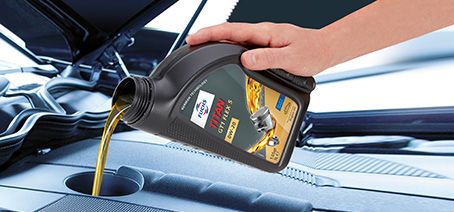The rise of counterfeit oils and the difficulties in spotting a fake
Last year, the chairman of > Verification of Lubricant Specifications (VLS), Mike Bewsey, warned of an expected rise in counterfeit vehicle lubricants. The cost-of-living crisis has opened the doors for forgers to manufacture fake lubricants, passing them off as the real deal for motorists and workshops looking to save money. The effects of these oils, however, can be extremely detrimental to your vehicle, resulting in costly repairs that far outweigh the savings made from purchasing a fake.
Genuine engine oil
Leading engine oil manufacturers invest huge sums of money and > many years of research to produce only the best quality lubricants. These lubricants not only ensure your engine and its components are well-lubricated, but they also contain additives to improve performance and increase lifespan.
Genuine oils provide several key benefits for the overall condition and performance of your engine, including:
Extended Engine Life - High-quality engine oil formulations protect vital engine components by minimising wear and corrosion, keeping components clean and removing impurities, extending the overall lifespan of the engine and leading to reduced maintenance costs or repair costs in the long term.
Extended Oil Change Intervals - The high-quality formulation of FUCHS engine oils ensures that they exhibit exceptional oxidation resistance, preventing the oil from breaking down over time. This characteristic ensures prolonged oil life, reducing the need for frequent oil changes.
Reduced Engine Deposits - The advanced detergents and dispersants in genuine engine oils help prevent the formation of deposits on engine components. This reduces the risk of sludge buildup and maintains engine cleanliness and efficiency.
Temperature Regulation - FUCHS engine oils are designed with sophisticated formulations that exhibit excellent temperature moderating properties. These properties are crucial for ensuring optimal engine performance.
Why are fake engine oils harmful?
Counterfeit engine oils often contain low-quality base oils and lack the advanced additives present in genuine products.
They also may not adhere to the specified viscosity levels, leading to inadequate lubrication and potential damage to engine components.
Compared with genuine lubricants, counterfeit products are often not subjected to rigorous testing and do not carry industry certifications, signalling a lack of adherence to quality standards.
Overall, the substandard properties of fake engine oils puts your engine at risk of rapid degradation and eventual failure.
Identifying counterfeit oils
Unfortunately, identifying counterfeit engine oil without advanced lab analysis is almost impossible. Often these products are specially designed to mimic authentic oils in appearance.
Fake engine oil manufacturers are going to great lengths to make their fakes appear genuine, making identifying them a complex task, even for professionals. Even for the numerous additives manufacturers carrying out their own extensive testing, finding a fake to compare has proven difficult. to highlight the effects of counterfeit oils on various components of a vehicle.
There are, however, a handful of common-sense checks you can make to identify possible warning signs.
Counterfeit engine oils often attempt to replicate the appearance of genuine products, including their colour. However, it is important to note that the colour alone is not a foolproof indicator of the authenticity of an engine oil.
Most genuine oils are typically a light yellow to golden colour, transparent, and free of impurities when new, although it is worth noting that some brands may intentionally add dyes to their oils for easy identification.
The odour of engine oil can be a telling characteristic and is often associated with the specific additives and base oils used in the formulation.
Genuine engine oils typically have a distinct but not overpowering odour, however, counterfeit oils may have an unusual or strong chemical smell that differs significantly from what you would expect from a genuine product. This can be due to the use of lower-quality base oils or the absence of specific additives.
Again it is worth noting that whilst the smell of an oil can be an indicator of its authenticity, this is not guaranteed.
Packaging can also be a tell-tale signs of a fake engine oil. Often, counterfeit manufacturers will try to cut costs wherever possible, resulting in poorer quality packaging than their authentic counterparts.
Look out for the following on your engine oil packaging if you suspect it may be fake:
- Inconsistent Labels and Colours: Counterfeit engine oils often come in packaging that may differ significantly from genuine products.
- Misspelt Words or Grammatical Errors: Counterfeit products may have noticeable spelling errors, grammatical mistakes or incorrect phrasing on labels and packaging.
- Missing Holographic Seals or Security Features: Authentic engine oils, especially from well-established brands often feature holographic seals, QR codes or other security features which may be missing from fakes.
- Inconsistent Batch Numbers: Genuine engine oils have batch numbers that help track production and quality control. Counterfeit products might have inconsistent or missing batch numbers.
- Unusually Low Price: While pricing can vary, an unusually low cost compared to the market average may be a red flag. Counterfeiters often offer their products at significantly reduced prices to attract unsuspecting buyers.
Our advice on the best ways to avoid buying counterfeit engine oil
The cost-of-living crisis we’re currently facing might make it tempting to hunt for a bargain online when shopping for your engine oil. The lower price of fake oil, however, is likely to result in a higher cost for repairs to your vehicle. To ensure you’re buying genuine lubricants, we have two main recommendations:
Only buy from reputable suppliers
These suppliers rely on their reputation and would be unlikely to take the risk of supplying counterfeit oil.
Favour engine oils that are labelled with OEM Approvals
These oils are fully tested and approved by OEMs. Engine oils labelled as ‘meets performance’, ‘suitable for use’ and ‘fit for purpose’ are subjected to minimal or insufficient testing, increasing the risk of damage to your vehicle’s components.
Need further advice?
If you would like further advice or information on counterfeit oils and how to avoid them, contact our team of experts using the enquiry form below.
Alternatively, you can learn more about FUCHS’ commitment to researching and developing only the highest quality, market-leading engine oils > here.
ANY QUESTIONS?
Here at FUCHS UK, our teams of experts are always on-hand to answer any of your questions. With years of experience in automotive lubrication you can trust that you’re in safe and knowledgeable hands.
NEED TECHNICAL HELP?
Speak to our technical team today to learn more about how FUCHS products can help you.



